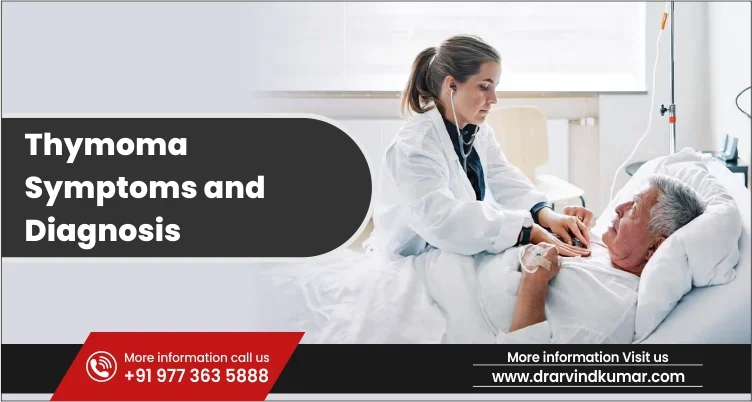Thymoma is a type of tumour that develops in a gland called the thymus, a small organ in your upper thorax that is part of your lymphatic system. The thymus gland is situated behind the breastbone. It is required for the development of T-lymphocytes, which are white blood cells that combat infection. (T-cells). Thymoma is one of two kinds of thymic epithelial tumors. Thymic carcinoma is the other. Both are rare tumors that act differently. Thymomas are a form of tumour that grows slowly.
Causes and Risk factors Of Thymoma
Thymomas have no recognized causes or risk factors. However, there appears to be a link between thymic cancers and a few autoimmune paraneoplastic diseases. Thymoma is frequently linked with autoimmune paraneoplastic syndromes where the immune cells attack healthy cells, leading to unpleasant symptoms. The following are the most prevalent paraneoplastic syndromes associated with thymoma:
Myasthenia gravis: It is an autoimmune disorder that affects your nerves and muscles, resulting in muscular weakness.
PRCA (pure red cell aplasia): It is a blood disease in which not enough red blood cells are produced by the bone marrow. PRCA causes anemia.
Hypogammaglobulinemia (Good syndrome): A disorder of the immune system in which your body does not produce enough antibodies to combat disease and prevent infections.
Thymoma Symptoms
Most individuals do not experience thymoma symptoms in the early stages. Rather, thymoma symptoms emerge when a tumor affects organs in your chest. Paraneoplastic syndromes are linked with additional symptoms.
Symptoms of a tumor affecting a chest region
Thymoma or thymic cancer can cause pain and difficulty breathing. Among the symptoms are:
- Pain in your chest or a sensation of pressure on your chest.
- Cough that would not stop.
- Breathing difficulty.
- Having difficulty swallowing
Tumors can obstruct or squeeze the vena cava, a big vein that transports blood to the heart. Superior vena cava syndrome is a serious disease caused by vena cava compression. If this occurs, you may experience the following thymoma symptoms:
- Cough.
- Breathing difficulty.
- Fatigue.
- Dizziness.
- Headaches.
- Your neck and cheeks are swollen.
- Your arms and forearms are swollen.
- Veins that are visible in the upper portion of your body.
Thymoma Diagnosis
After conducting imaging to determine what is causing your symptoms, your doctor may discover you have a tumor. If a thymoma diagnosis is suspected, doctors can initially perform a physical examination and review the patients medical history, considering their age, symptoms, and pre-existing medical conditions, if any.
There are also a variety of diagnostic tools available to help doctors search for thymoma in internal organs. These are some examples:
- CT images (computed tomography)
- PET images (positron emission tomography)
If the scans show abnormal results, the doctor may conduct a biopsy to check the tumor to give a definitive thymoma diagnosis. A biopsy is the only method to be certain of a diagnosis. Tumor cells will be removed and examined under a microscope by your physician.
If it is safe, your doctor will remove the complete tumor and test the cells. If your provider cannot securely remove the entire tumor, a sample will be removed for testing. A biopsy can be performed using a needle or manually.
If you have Myasthenia Gravis and the imaging tests show a thymoma, doctors may forgo the biopsy and proceed directly to tumor removal.
During thymoma diagnosis, the doctor may discuss the stage of the disease, which explains how the disease grows and spreads. This information is important because it guides treatment options.
Thymic tumors are also classified according to the arrangement of cells within the tumor.
A thymoma diagnosis can be unexpected and frightening, so patients should ask their care team as many questions as they can to better grasp the disease and the next steps.
Thymoma Treatment
Thymoma treatment will be determined by a number of variables, including the type of tumour you have and the stage of your tumour. Other factors include whether the tumour is freshly diagnosed or has previously gone away and returned. (recurred).
Thymoma treatment options include:
Thymoma surgery: It is the most prevalent treatment method for this tumor. This is usually accomplished through surgery, in which the breastbone is opened, and the thymoma and surrounding tissue are removed.
We specialize in removing thymomas, even large ones by robotic surgery, which avoids big cutting of the breast bone. Sometimes, if the thymoma is very large we give chemotherapy before to shrink it. We have excellent results even in large tumour which have spread to the pleura. In these cases, we combine extensive radical surgery with heated intra operative chemotherapy in chest (HITHOC).
Radiation: External beam radiation treatment may be used by a radiation oncologist to deliver radiation to the cancer site. This therapy employs a machine that directs X-rays at the tumor to kill cancer cells. Radiation is usually used as an adjunct after successful surgical removal of large tumours.
Chemotherapy: If your tumor cannot be removed surgically, you may be given chemotherapy medicines to kill cancer cells. A hematologist or medical oncologist may also recommend chemotherapy to shrink tumors prior to surgery or to address recurrent cancer.
Targeted therapy: You may receive targeted therapy if your cancer cells contain particular gene mutations. Targeted therapies are intended to kill cancer cells by targeting particular gene mutations. If other treatments, such as chemotherapy, have failed to cure thymoma or thymic carcinoma, targeted therapies may be a possibility.
Immunotherapy: Immunotherapy strengthens your immune system, allowing it to detect and eliminate cancer cells more effectively. Immunotherapy may be possible if you have thymic carcinoma that has not responded to chemotherapy.
Conclusion
A thymoma diagnosis can indicate a variety of things. These tumors develop slowly. Some can be fully removed with surgery, while others have already spread by the time your doctor diagnoses you. Inquire with your doctor about how your tumour will affect your results. Discuss the advantages and disadvantages of all possible thymoma treatment options.
Frequently Asked Questions
What part does surgery play in the treatment of thymoma?
The majority of thymoma patients are treated with thymoma surgery at first. Surgical excision reveals the histologic characteristics of the tumor and gives staging information, which aids in determining whether adjuvant treatment is required. Thymomas, both small and encapsulated, are excised for diagnosis and therapy.
In what ways cancer spreads in the body?
Cancer spreads in three methods within the body. It can disseminate through tissue, the lymph system, and the blood:
- Tissue: Cancer spreads from where it started into neighboring areas.
- The lymphatic system: Cancer moves from the site of origin by infiltrating the lymphatic system. Cancer spreads to other areas of the body via lymph vessels.
- Blood: Cancer expands from the site of origin by entering the bloodstream. Cancer spreads to other areas of the body via the blood vessels.

.webp)



